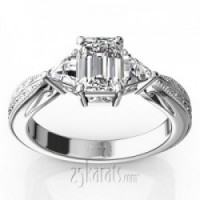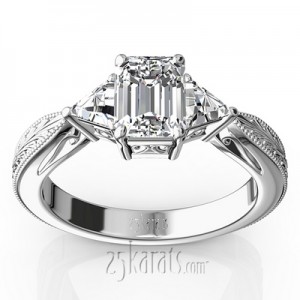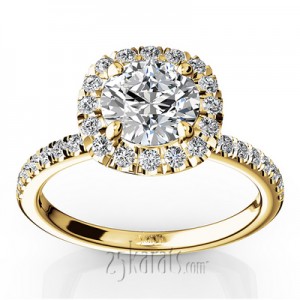Since you are in the market for an engagement ring, you know that the diamond is the star. And you know that it’s not going to be an easy choice! But being well-informed is the way to make this decision easier. Knowing the four Cs: color, clarity, cut, and carat is the best way to choose the right diamond.
Color . If you think diamonds are white, think again. Traditional diamonds are technically colorless. Stone color is measured on a scale from D to N and below. D grade stones are the highest quality you can find, and are colorless. These are fairly rare, but higher grade diamonds should be your choice if you are looking for a colorless stone. As you go further down the scale, the diamonds contain bits of color. For example, diamonds graded K-N contain traces of yellow. But, these are also cost-effective options. Or for something different, choose a rare colored diamond. Some rare (and expensive!) colors are blue, pink, or black.
Cut. The cut is the most important aspect to consider when choosing a stone. Most people picture the shape of the diamond, like princess or round, when thinking of diamond cut. But the cut more accurately refers to the stone’s symmetry, proportions, and facets. The perfect cut can greatly enhance the shine of a diamond. Likewise, a poorly cut stone is a waste of money.
While you don’t necessarily need to know all the vocabulary related to cuts, you should know a few things. If a diamond’s cut is too shallow or deep, the shine will be greatly diminished. An ideal cut will allow light to pass through the diamond and then reflect upwards, maximizing shine. Most retailers will scale diamond cuts using a naming system such as Excellent, Very Good, and Good. Anything below Good is not recommended the diamonds will noticeably lack brilliance.
Clarity. Think of clarity as the perfection of the diamond. Most diamonds contain slight internal inclusions (or imperfections). These normally cannot be seen unless you view the stone under 10x magnification. Diamonds that do not contain any type of imperfections are very rare and are called Flawless. Clarity is graded on a wording scale, again keeping in mind that the word inclusions refers to internal imperfections. You can buy diamonds that are Very Slightly Included or Included for a decent price. These will still be beautiful stones and are a great value. The imperfections cannot be seen without magnification. But avoid diamonds that are very included because they will noticeably lack shine.
Carat . The carat is how heavy the stone is, and one carat amounts to 200 milligrams. If you see a point scale, keep in mind that smaller diamonds are measured so that 100 points totals to one carat. Carat and cost go hand and hand. Since large diamonds are rare, high-carat diamonds are much more expensive. Also, remember the shape of your diamond will affect how the carat will appear. Different dimensions of the various shapes can be almost like an optical illusion. Square cut diamonds typically look larger, even if they are not a high carat.
Now that you know the four C’s, you’re a diamond expert!



